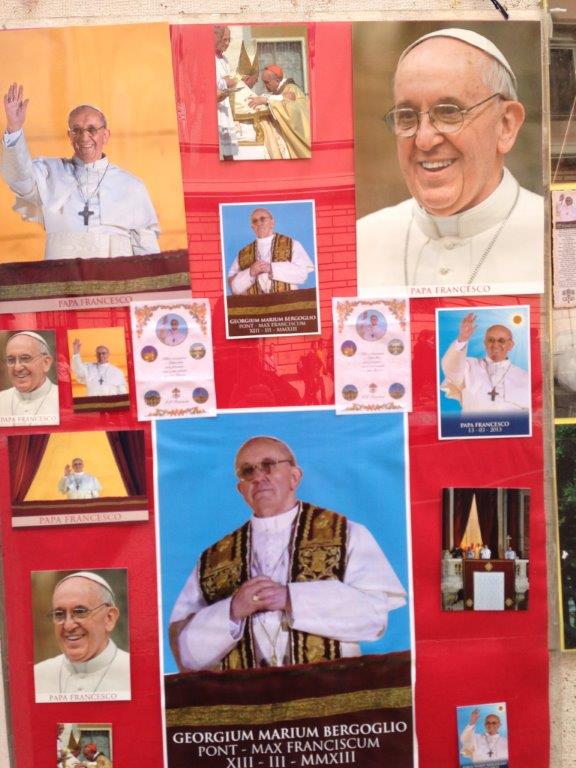 |
| ||||
World Security Network reporting from the Vatican in Italy, March 31, 2013 |
| Dear Friends of the World Security Network,
For the first time the new Pope Francis is celebrating Easter Saturday at the impressive St. Peter’s Cathedral in the Vatican, and I am sitting close to him behind a row of cardinals. This is my fifth Easter Saturday in the Vatican, the last four with Benedict XVI. Easter 2013 is quite different. A majority of women are reading from the Holy Bible, one even singing in an emotional and nice voice, which is touching us all. Pope Francis is preaching, something I always missed with Benedict. He tells, first in a slow and soft voice, later quicker and more vehement with his hands in the air: Our daily problems and worries can wrap us up in ourselves, in sadness and bitterness… and that is where death is. That is not the place to look for the One who is alive! Let the risen Jesus enter your life, welcome him as a friend, with trust: he is life!" (see full text here). These words are directed to the Roman Curia as well: do not fear - have courage - go out into real world - like Jesus did! Francis is not aggressive, but he has inner fire and a mission. Compared to him, the 26 cardinals around him look more pale and old, like grapes who have become raisins due to their life-long service, without inner power or energy to change the world.
Francis also baptized four young men, first time in front of the altar and hugged them all later; one of them a handicapped young man from Asia - very emotional. He cut the service to a normal length of less than three hours and played the main role, while Pope Benedict was more passive.
Easter became the meeting of traditional ceremony with a fresh approach from the Jesuit priest from Argentina. These ceremonies were as well another puzzle piece in the power play between the Pontific and the Curia, the traditional network of mainly older Italian cardinals and priests and their thick network of power in the Vatican.
As an Italian insider told me, who watched the inauguration of Pope Francis and has known the top organization of 1.2 billion Catholics for decades: “The Italian Curia does not care so much who is the Pope, who has, in day-to-day reality, a more ceremonial office in the Vatican and represents the church on the outside, but do care who rules the Vatican and possesses the power within the organization. This had always been the Number Two, the Cardinal Secretary of State. This position really executes the power, backing or blocking promotions, new rules, declarations and reforms. The Italian cardinals still hope, it will again be one of them who knows the Curia well. This would save the old networks and their inner-Curia power against reforms. So the watershed is if Pope Francis will choose a non-Italian reformer to become the head of the administration or not.”
Francis has to act, as the church is in a very deep crisis that goes deeper in the Vatican than many notice. Repeatedincidents of corruption, money laundering and financial intransparency, blackmailing of homosexual clergy, the burden of pedophile incidents, and political power-networking in the Curia. You may find many details in the still secret 300-page document of the ‘Vatileak’ inquiry, where cardinals looked into the affairs of Benedict XVI’s private butler Paolo Gabriele in 2012. The former pope declined the request of his cardinals to make the report public. He stepped down as he did not have the strength to clean up the mess in the Vatican. But Francis has read the report and knows the black sheep in the Curia now and the weak sweet-spots in Rome. 
"One should never underestimate the strong will, spirit, intellectual capabilities and large global network of a SJ - Pope Francis, in the end, will prevail, with a fresh spirit and style in the Curia and the world."
Former Buenos Aires cardinal Jorge Mario Bergoglio set the new tone on cutting several old habits. The devoted Jesuit started the reform process with several very small steps: When greeting the masses after the election, he kept his simple cross instead of a golden one and asked for their prayers. After the election he did not use the special Mercedes car, but a bus where he sat in the second row, joining the cardinals. He does not wear the traditional red shoes. He stays in the cardinals guest house Domus Sanctae Martha in Suite 201 and did not move to the pompous papal apartment in the Apostolic Palace. On Holy Thursday Pope Francis washed and kissed the feet of two young women in a surprising departure from church rules that restrict this ritual to men. He included Muslims and Orthodox Christians. “Washing your feet means I am at your service," Francis told the young people at the Casal del Marmo detention facility in Rome.
He allowed the archbishop of Havana, Cardinal Jaime Lucas Ortega y Alamino, to read from a document given to him by Pope Francis, outlining the speech he gave during the pre-conclave General Congregation meetings of the Cardinals. This speech makes his desire for reforms against ‘ignorance, self-reference and narcissism’ clear. Bergoglio told the cardinals who voted in favor of him: “Evangelizing pre-supposes a desire in the Church to come out of herself. The Church is called to come out of herself and to go to the peripheries, not only geographically, but also the existential peripheries: the mystery of sin, of pain, of injustice, of ignorance and indifference to religion, of intellectual currents, and of all misery. When the Church does not come out of herself to evangelize, she becomes self-referential and then gets sick. The evils that, over time, happen in ecclesial institutions have their root in self-reference and a kind of theological narcissism. In Revelation, Jesus says that he is at the door and knocks. Obviously, the text refers to his knocking from the outside in order to enter but I think about the times in which Jesus knocks from within so that we will let him come out. The self-referential Church keeps Jesus Christ within herself and does not let him out. When the Church is self-referential, inadvertently, she believes she has her own light; she ceases to be the mysterium lunae and gives way to that very serious evil, spiritual worldliness. It lives to give glory only to one another. Put simply, there are two images of the Church: Church which evangelizes and comes out of herself, the Dei Verbum religiose audiens et fidente proclamans; and the worldly Church, living within herself, of herself, for herself. This should shed light on the possible changes and reforms which must be done for the salvation of souls. Thinking of the next Pope: He must be a man who, from the contemplation and adoration of Jesus Christ, helps the Church to go out to the existential peripheries, that helps her to be the fruitful mother, who gains life from ‘the sweet and comforting joy of evangelizing'.
The Pope was elected because of this credo of promoting an ‘outgoing church’ which means a church appealing to realities and the people. His first small steps of reform are meant to promote a new moderate style, reach the masses and enhance the lost credibility of the church.
Francis is the first Pope from the Americas and the first Jesuit Pope as well. He is strongly influenced by his roots in Argentina and the spirit of the Jesuits thinking which became a strong part of his life, soul and thinking.
Some could even think we have not only two, but three popes now in the Catholic church: Pope-emeritus Benedict XVI, acting Pope Francis and a third man behind the scene, the ‘Black Pope’, or the Superior General of the Society of Jesus (SJ), as the Jesuits refer to him. He is generally addressed as Father General. This position sometimes in the media carries the nickname of the ‘Black Pope’, after his simple black priest’s dress. The Superior General since 2008 is the Reverend Father Adolfo Nicolás. The Spanish priest was working in Japan and the Philippines. The Society of Jesus is very international and not Italian- or Europe centric with 20,000 male members, among them many intellectuals. The society is engaged in evangelization and education in 112 nations and is strong in the U.S. (like Georgetown University in Washington DC, where I worked at CSIS 1983/84 or Boston College) and India. Jesuits work mainly in education, intellectual research and cultural pursuits. They promote social justice and enical dialogue like the Second Vatican Council in 1965. It is certain that Francis will promote the Jesuit way of belief, spirit and soul as he purposefully chose the name Francis. He told the media in his first press conference: “The name of Saint Francis of Assisi entered my heart, the man of poverty, the man of peace, the man who loves and safeguards God's creation.”
As historically the Jesuits influenced China in the 16th and 17th century and the Emperor almost adopted this religion, the start of diplomatic relations with China will become another focus of Francis.
But what is the Jesuit spirit? You have to look into the latest history to find the golden nuggets of their thinking. In Latin America Jesuits have been involved in highly controversial debates including liberation theology and social justice and then in the U.S. in more open debates about women’s role, priesthood, sex abuse cases, in short “an open debate from stagnation to renewal”. They are more open than others for debates and real life.
What are the limits of Francis? Clearly to avoid a split of the Catholic Church and a revival of the ultra-conservative circles of the Society of Saint Pius X.
But one should never underestimate the strong will, spirit, intellectual capabilities and large global network of a SJ...
Pope Francis, in the end, will prevail, with a fresh spirit and style in the Curia and the world.Dr. Hubertus Hoffmann President & Founder World Security Network Foundation |

